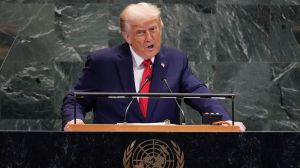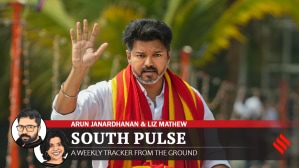When palace responds to street
There is a price attached to the comic relief being provided by the blocked American elections. The cost could well be the highest in the ...

There is a price attached to the comic relief being provided by the blocked American elections. The cost could well be the highest in the Middle East where structures set up under US auspices are in the process of being dismantled. As former secretary of state James Barker pointed out, the inconclusive elections could harm the US internationally.
Of course the transition from one US administration to another will be complete only in January but, even so, the partial and largely psychological vacuum has coincided with the Al Aqsa intifada reaching its peak and the Arab leaders finding themselves unable to ignore the suffering of the Iraqi people, Saddam Hussain or no Saddam Hussain.
Witness Cairo’s resumption of diplomatic ties with Baghdad despite the sanctions. Amman had broken out earlier. Even the Gulf states, responding to restive populations, have sent planes to Baghdad loaded with humanitarian aid.
Saudis, the ultimate bastion of Arab conservatism, are watching the situation carefully. But they, too, have not been left behind. In fact, Riyadh has changed its tune quietly, without being noticed. They have opened the land border with Iraq and millions of dollars worth of goods are flowing into Baghdad.
The irony is that some of this is happening with the Americans deliberately turning the other way. Why? Because Iraq has emerged as the swing producer at a time when high oil prices are threatening Western economies. But most of these shifts are taking place in response to an enraged Arab public opinion. Arab rulers are simply not being able to retain the structures handed to them by Pax Americana. In the conflict between the street and the palace, the street is prevailing. American links were with the palace. The peculiar jam in the American electoral process looms at a time when some nimble-footed diplomacy on the part of the US was required for damage control.
The volatility in the Arab situation can be attributed to a variety ofreasons. The stamina of Arab populations appears to be running out chasing the mirage of Arab unity focussed on the question of Palestine. The other mirage the Arabs have been chasing is the one of Islamic unity centered on the issue of Jerusalem. In fact, the OIC or the Organisation of Islamic Conference came into being after a `demented Australian’ set fire to the Al Aqsa mosque in 1968.
The other reason for this volatility is the simmering realisation among the public that structures imposed on the Arab potentates by Pax Americana were patently iniquitous. Prime Minister Barak’s political instability and, therefore, his inability to deliver on the agreement to withdraw from occupied lands has recoiled on American credibility in the region.
So far Arab regimes have been able to manage or muffle the voice of thepeople. After the American bombing of Libya in 1985 (Qaddafi’s daughter was killed in the raids) my syndicated story on the event was put across all eight columns of La Republica in Rome but when I reached Amman the story was consigned to a single column notice on the inside pages. A wave of popular sympathy for Qaddafi had to be played down by regimes who saw their security in the American framework during the Cold War and Pax Americana after.
The Arab summit in Cairo last month was something of a watershed. For the first time the Arab leaders were congregating in response to the general anger on street. The decisions taken were radical by any yardstick. After all, it was with considerable effort that the United States had persuaded Morocco, Tunisia, Qatar and Oman to establish economic ties with Israel. Economic interaction would lead to a general thawing of political relations, it was assumed. In fact, Saudi Arabia and Kuwait would have followed had the Mid-East peace process remained even in the proximity of the tracks outlined in Madrid, Oslo and Camp David. Alas! It is impossible to be optimistic about the peace process at this stage.
Of course, the final document that came out of Cairo bears the stamp of old draftsman who knows how to buy peace in the Arab world. The two funds that have been created are their handiwork: the Al Quds fund for Jerusalem and the other for Palestinians affected by the intifada. But this was not seen to be enough. Hence the call on all Arab states to severe economic ties with Israel. Egypt and Jordan were exempted because they have treaties with Israel.
Morocco, Tunisia and Oman obliged but Qatar held out. It was audacious of this Gulf state with the population of two-and-a-half lakhs but the third largest known gas reservoir in the world to attempt to break ranks with the Arabs on this count.
But since the OIC summit was taking place in Doha, capital of Qatar, the regime came under pressure with Saudi Arabia and Iran threatening to boycott the summit if Qatar did not comply with the resolution adopted in Cairo. Ultimately Qatar fell in line to save the summit.
In any case Qatar has played a historic role in another way. What is emerging as the most liberal regime in the Gulf, has allowed an independent TV station, Al Jazira. This TV station’s honest coverage of the intifada has been largely responsible for the uncontrollable anger on the Arab streets.
It is impossible to be optimistic about the Middle East peace process at this stage.
Photos



- 01
- 02
- 03
- 04
- 05




























